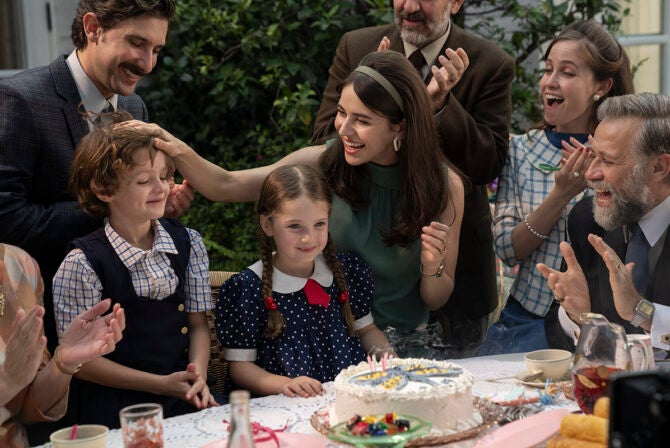“Mommy, are you going to fast this year for Yom Kippur?”
My 7-year-old asked me this question on the way home from school the other day, just hours after I had decided to tackle the question of fasting for my next Jewish Mother Project. I told her I wasn’t sure and asked if they had talked about it in school.
“Yes. When we talked about people not eating or drinking all day, my eyes watered up a little bit. I feel so sad when I think about people not taking care of their bodies and making healthy choices and being so hungry and thirsty all day. I just wanted to cry but I was at school so I didn’t. So I don’t want you to fast. Please don’t, Mommy. Please?”
READ: Mayim Bialik: Why I Fast
I could see the tears welling up in my little girl’s eyes as I promised her that no matter what I did for Yom Kippur, I’d make sure that my body was healthy. We talked about pikuach nefesh, and she seemed relieved to learn that Jewish law tells us to take care of our bodies even if it means breaking other rules.
She was satisfied with my response, but I wasn’t. I still hadn’t resolved the question of whether or not I would fast. For the past 10 years or so, I’ve followed a familiar pattern. I tell myself I’m going to fast, and then I end up sneaking small amounts of food throughout the day. I’m not sure who I was hiding the food from, as my husband doesn’t impose his fasting on me, but I still felt ashamed of my snacks.
The truth is that I’d never spent much time considering whether or not I wanted to fast, nor did I ever have a plan for how I would manage the day. I’m not good at fasting, nor does it come easily for me. I quickly move from feeling somewhat virtuous to a prolonged state of hanger (hunger-induced anger) and by lunch I have descended into a barely-manageable state of extreme bitchiness. I do my best to stay calm (mostly by keeping my mouth shut) at services, but once we’re in the car headed home, I can barely tolerate anyone or anything.
READ: How to Do Yom Kippur Without Fasting
I wanted this year to be different. I wanted to head into the holiday with a sense of what fasting means to me, and what my practice would be. I wanted a sense of intentionality that I hadn’t previously had. But first, I decided to get a little more information about how and why others in my community observe this practice or not. I sent an email asking if people fast or not, and the reason for their decision, to the list-servs at my Reconstructionist synagogue and my daughters’ pluralistic Jewish day school. I also posted the question on Facebook.
The answers I got were fascinating and illuminating. Folks reported a range of practices from fasting to not fasting to eating small amounts of bland food at pre-set times of the day, and a range of reasons for their practices.
Here are some of the most common responses I got for why people fast:
– Because it’s a mitzvah/religious obligation
– Increased ability to focus on atonement (or, as one woman wrote, at-one-ment)
– Sense of connection to generations of Jews who have done it before them, as well with Jews across the world who are also fasting
– Because they’ve always done it
– Awareness of individuals throughout the world who go hungry on a regular basis (one writer described it as a “wake-up call for tikkun olam”)
– Practice controlling our own behavior
The most common reasons I read for why for people don’t fast included medical concerns or being pregnant or nursing. Here are a few other ones:
READ: Yom Kippur Break Fast Recipes
– The weakness and discomfort of hunger is too distracting, and they are unable to focus on atonement
– Not religious
– Didn’t grow up fasting
– Unable to parent effectively while fasting
– Discomfort with societal messages about women needing to punish themselves for being too fat or unattractive and the ways in which fasting can support the link between food restriction and self-punishment
Every single one of these responses (including the diametrically opposed ones) resonated with me to some degree, but there were two in particular that really helped me formulate an intention and a plan for my Yom Kippur fasting practice.
My friend Rabbi Sue Fendrick wrote that, “Change is important, and it is possible. The fast on Yom Kippur literally embodies the chance to practice controlling our behavior and to realize that our self-control muscles, the ones we need to exercise in order to do things differently, do work. And more than anything we might read, think, hear, or say teaches us all we need to know: we are capable of doing things differently. Without that, nothing else on Yom Kippur matters.”
Yom Kippur is the day of teshuvah, or the act of returning to our best selves. Our apologies to ourselves, our family, our community, and to God are a call to action, to a change in behavior. I knew that I would benefit from greatly from fasting, from the concrete, embodied reminder that I am capable of change.
But I was worried I couldn’t do it, and I wanted a plan, a way to honor the fast while also honoring who I am as a person, including my limitations and challenges. The answer came from a fellow congregant, who wrote that she suffers such ill effects from fasting that now she cooks a pot of plain brown rice (no seasonings at all) the night before Kol Nidre, and scoops out two one-cup portions. She eats one cup, cold, tough, and bland, in the morning before services, and another at 3:00 p.m. She wrote:
“My strategy is to take the edge off of the health effects while making sure that I am not gleaning pleasure from rich or delicious foods. I aim to forgive myself and also to curb my own judgments.”
At last, I knew what I was going to do: I decided to follow her brown rice strategy.
And then I forgot to make the rice.
I woke up on Wednesday morning thirsty and with a mild headache, a condition that would last all day, but I didn’t eat or drink anything. All day. I certainly wanted to, and I even briefly considered snagging a rice cake off the gluten-free snack table in the childcare room, but I didn’t. Later in the afternoon I saw a woman walking down the street eating a peach, and I wanted to rip it out of her hand.
But I didn’t.
I didn’t break the fast until I was making the girls’ dinner and I accidentally tested one of the noodles I was cooking for them. And then I didn’t break it again until our friends came over and the Chinese take-out arrived.
READ: This Yom Kippur, I Owe Myself an Apology
The difference this year is that I had a clear reason for fasting, which I have never had before. I wanted to remind myself that I am capable of change. If I can go 24 hours without food or water, perhaps I can bite my tongue when I’m about to snap at my girls or speak ill of someone else or rip a peach out of a stranger’s hand. Perhaps.
At the end of the day, when I was putting my daughter to bed, I told her that I had fasted, and that I was OK.
“That wasn’t so bad, was it?”
She thought for a minute, and said, “No, I guess not. You were only grumpy in the car on the way home from synagogue and then on the walk to our friend’s house and then a little bit while you were making dinner. It wasn’t so bad.”
I’ll take it.
Missed the last one? Check out past Jewish Mother Project posts here







